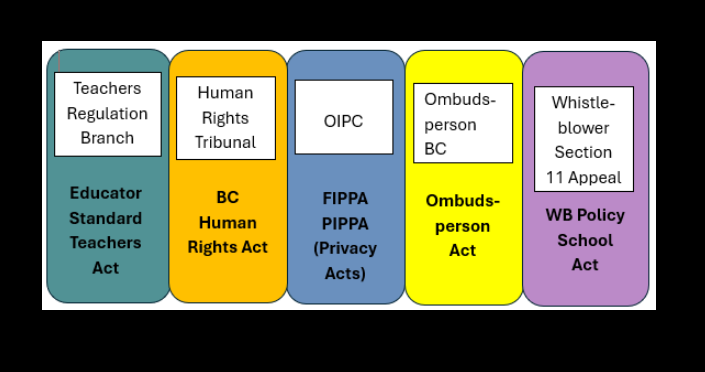This blog is about why Speaking Up BC started, why it is still ticking, and why it will ALWAYS be ticking.
100% this website exists because of how my children’s school district and their lawyers have been engaging with me. Why they think their adversarial strategy benefits them, I have no idea. I know they don’t like this website. I actually at one point thought I wanted to just shut everything down and slip away back into my old life. I actually almost deleted Speaking Up BC. And then they did something that ensured that would never happen. That is when I had it confirmed just how dirty this system really is, and for that reason, I am all in. Until my final breath.
When I think about it, they have been funding my advocacy projects and provided me with life experiences that I have been able to turn into knowledge and lived experience to pass along to all of you. Pain into purpose. All of the content of this website is because of them and how they chose to engage with me. Feel free to send them flowers.
If they did the exact opposite of everything they have been doing, I guarantee you, all the complaints I have filed would never have happened. This website would never exist. The HR decisions never would have been. P.A.T.H. would never have been created, and clearly P.A.T.H. needs to exist for a very long time. They have provided me with ample evidence.
Not only do I have decisions, yup 3 decisions, from the BC Human Rights Tribunal, each with its own gems, benefiting parents’ advocacy. (All paid for by the school district, hundreds of thousands of dollars.) But I have learned so much and have become the advocate I am today because of their “training program”. It’s been a world I have been able to learn and study from that I never would have had access to if they decided to be human and resolve things with me, instead of fighting me. They have now become predictable to me, and that is glorious.
I am not the same person I was 5.5 years ago. My emotional regulation skills are now at such a higher level. I have been able to sharpen my skills with all the experience. What they thought would break me, has actually built me. Now I’ll send flowers.
There are parents that are crossing their fingers that the lawyers just keep pissing me off, waiting for more content. More fence testing opportunities.
The birth of this website was at a time when I was pushed to my limits. Each time I think I reach a limit, I find out…actually, I can keep going. And I am growing, and still growing. When all of this started I was an emotional mess. I look back at emails from the beginning, and oh my word. I wonder who is this person who wrote this ridiculousness. Work. Rest. Grow. Repeat.
This website is because I want parents to benefit from everything that I have gone through. I want to give people as much information as possible. I don’t want any parent to feel that lost or desperate for information, not even for 5 min.
This website has grown into quite the beast. I started out having zero people reading my website with a handful of people reading my blogs. But over the years it has been growing. The stats on this website still shock me…and make me giggle. (hee, hee)
My blogs get posted, and depending on the topic, can reach around 1,500 page views of that blog in just 24 hours and the numbers just climb over the next few days. Even on days of no blogging, my stats are high. Over the last 4 years, they are consistently climbing, with almost 100,000 page views. Almost 20,000 thousand people have been accessing this site.
It’s not just parent(s)/guardians contacting me for help. It’s employees, parents advocating in healthcare and community services, and high school STUDENTS asking for help.
So, let me state the obvious. To the school districts and the 4 most commonly used law firms representing the school districts….when you piss off mama bears, and poke them and fight them, these mama bears go searching, and when they do go searching, they find this website and they will find their community. I already know there are parents out there quoting my website content. Save yourselves and your district a lot of taxpayer’s money and stress, and try working with people and not against them. eh?
I had a reporter from CBC in Ontario contact me and she said I am the only parent that she can find in Canada with a website about this kind of education information. I was like…that can’t be true, seriously? And she said yup, the only parent I can find. The sheer volume of blogs I have written creates a lot of search terms that make it easier for people to find me. I don’t know how the algorithms work but there are a TON of people finding me just off of Google searches. I have people all over Canada contacting me.
For parents who want to blog and start sharing their own experiences, whether it be about the medical field or education, any tips and tricks that you learn navigating the system, there is a very good chance you will have an audience who will benefit. I can’t tell you the number of people who have reached out to me and thanked me for my website.
For the people who are interested in elevating their advocacy to a wider audience…
You can do this too! I really encourage people in other provinces to start this kind of information that is specific to your own provincial systems. We are all dealing with similar things and have similar complaint avenues, but they aren’t exactly the same. In Ontario, the Teacher’s College actually gives parents the teacher’s submissions and they have a specific department for the human rights tribunal for education matters.
Websites can cost a couple hundred a year to maintain. You can create them through WordPress. I had zero training and just figured things out as I went along. You can YouTube on how to create websites. Speaking Up BC is certainly not a fancy design. It’s literally just a template on WordPress.
If you start up a website, send me your link. I’ll start up a parent website page with everyone’s site. We can be like a big spiderweb and all link together.
I just caution people to be very thoughtful about what they put on their website and to not name anyone, and to be aware of defamation. Know the difference between allegations (accusations before proven in court/tribunal) vs. facts proven in court/tribunal. But all of those things that you learn along the way, that lived experience. That is gold! Capture that!
You can also start up a YouTube channel for free! Social media pages! Facebook pages/groups!
I have found in the last 5.5 years I have bounced all over the place in terms of my emotions, from times of forgiveness and healing, to dipping back into anger and sheer disappointment in the system and with the people who are choosing to follow along and treat parents in this way.
I remember when I first started the human rights tribunal process their response to the complaint had me running on anger. I was determined to do a hearing but also wondered how I was going to have it in me to pull that off. The good thing about the tribunal process is that it takes years to get to a hearing. You won’t be the same person in those years. You will have opportunities to sharpen your skills. To grow and learn. Not only mentally with learning things but emotionally as a person.
During my process, there have been times when I have benefited from reaching out to counselling services to help emotionally manage everything. Rhodes College has students from their counselling program that you can access Affordable Counselling which was around $25 per hour or even less, when I accessed it years ago.
I now work in a profession where I navigate the human rights tribunal as my career and help people with their human rights issues, full-time. I love it!
I think a big part of my success in navigating these systems has been because I am completely willing to fall flat on my face and push into unknown territory. I just don’t care if I fail. There are always gems of goodness in “failure”. Is it ever really a failure? It’s just a step really. Part of the process of getting really good at something.
So, you know what? Go ahead…piss me off. Good luck with that.
It’s all just gas in my gas tank.
This website will be available forever. I even joked with my husband that I want it put in my will that our children are required to pay for the domain name to keep this going. HA!
One thing I learned through this process is to trust myself. I have more in me than I even realized. I can do hard things. I can learn. I can grow.
I am not the only one.
School districts and their lawyers will always underestimate parent(s)/guardians. We don’t need to underestimate ourselves.
There are lots of us who are navigating these systems and they are turning into fine-tuned advocacy machines. Some are writing books, starting businesses, starting non-profit organizations (BCEdAccess, Dyslexia BC, InspireFASD, ADHD Society) leading DPACs, advocating in the media, and making career changes to enter the education system.
So, you know what? Go ahead… piss us off! Good luck with that.

